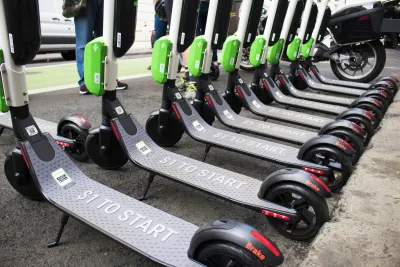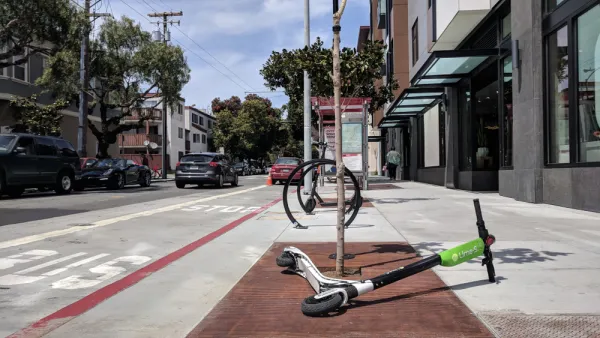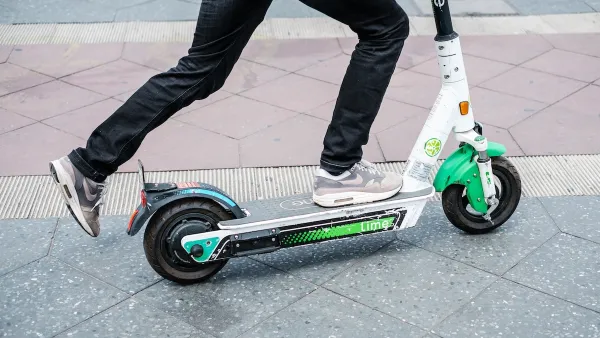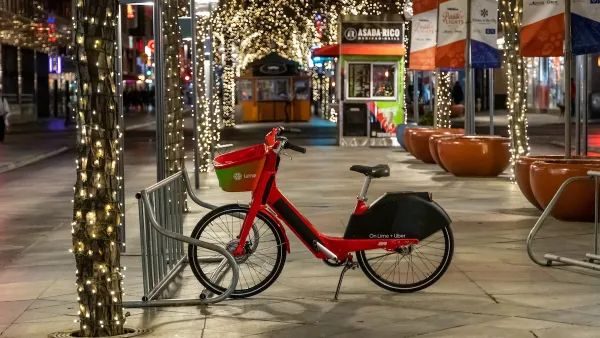A new study indicates that cities across the country are defining and regulating personal transportation devices in very different ways.

In recent years, various micromobility modes have sprung up in cities around the world, along with a flood of news and commentary about scooter safety and regulation, debates about the legalization of micromobility, and who should be responsible for developing policies in this new era of urban mobility.
Much of the coverage looks at incidents and controversies in particular cities. But what are the broader trends in policies and regulations? And is there consistency in the ways that cities are dealing with micromobility? In May, the Mineta Transportation Institute released a report about personal transportation devices—including e-scooters and skateboards—that examines how municipalities are defining PTDs and the regulations they are implementing in their jurisdictions.
"The review of existing regulations in states, cities, and university campuses revealed that PTD users operate in a murky regulatory environment, with rules often poorly defined, contradictory, or altogether absent," conclude researchers Kevin Fang, Asha Weinstein Agrawal, and Ashley M. Hooper. For example, regulation of motorized scooters varies greatly, with some cities requiring riders use them on sidewalks, while others allow them on sidewalks or prohibit them completely.
From a review of the literature and existing regulations and interviews with stakeholders, the researchers recommend that regulatory codes be developed at the state level, though local jurisdictions should have some flexibility and authority to limit use of particular PTDs. In addition, they say that PTDs should be regulated as a class, rather than as individual devices, and that users should be allowed to use both streets and sidewalks under a set of rules that protects all travelers.
Fang and Agrawal discussed the findings of the study during a webinar hosted by the Eno Center for Transportation. The researchers also are making their data files available, which include all the regulatory information and details they collected about PTDs from all 50 states and five U.S. territories, 101 cities, and 20 college campuses.
FULL STORY: Where Do I Ride This Thing? “Rules of the Road” for Personal Transportation Devices (PTD)

Analysis: Cybertruck Fatality Rate Far Exceeds That of Ford Pinto
The Tesla Cybertruck was recalled seven times last year.

National Parks Layoffs Will Cause Communities to Lose Billions
Thousands of essential park workers were laid off this week, just before the busy spring break season.

Retro-silient?: America’s First “Eco-burb,” The Woodlands Turns 50
A master-planned community north of Houston offers lessons on green infrastructure and resilient design, but falls short of its founder’s lofty affordability and walkability goals.

Test News Post 1
This is a summary

Analysis: Cybertruck Fatality Rate Far Exceeds That of Ford Pinto
The Tesla Cybertruck was recalled seven times last year.

Test News Headline 46
Test for the image on the front page.
Urban Design for Planners 1: Software Tools
This six-course series explores essential urban design concepts using open source software and equips planners with the tools they need to participate fully in the urban design process.
Planning for Universal Design
Learn the tools for implementing Universal Design in planning regulations.
EMC Planning Group, Inc.
Planetizen
Planetizen
Mpact (formerly Rail~Volution)
Great Falls Development Authority, Inc.
HUDs Office of Policy Development and Research
NYU Wagner Graduate School of Public Service




























